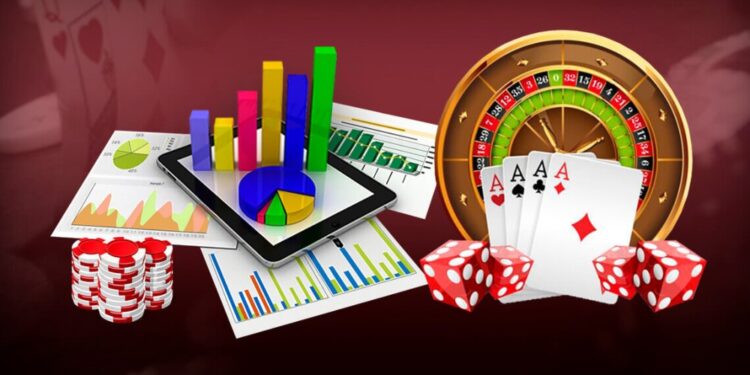Gambling isn’t merely a matter of luck; it’s an art form based on intuition and skill. The gambler must use their head in order to get the best odds possible. In this sense, gambling is an art. The gambler looks for the best opportunity and then creates their own strategy based on risk/reward ratios and how they think other gamblers will behave in different situations.
A gambler who plays craps would know that if you make a point with say, three or eleven, you have a chance of winning with double odds because the house edge is higher when that happens than if you made your point with two or twelve (the latter always win). The gambler may also use psychological insight to his advantage or create their own angle to a betting event or game.
They are taking in information from games, teams, players, coaches, and so on – all the while developing intuition that might make them money in the end. The art is in knowing what to look at and how to interpret it, while at the same time gauging how others will react to certain information. Gambling can be an art form based on skill as well as intuition.
Sports betting, for example, requires close observation of the action, as well as a heightened sense of perception and intuition. Yes, you can study the teams, players, coaches, and so on. You can even learn the statistics that back up each situation: In this way you are looking at each item from a numbers perspective. You are also taking in all that information to decide what to make your point on.
However, there is a skill to making your bets based on what has happened in the past as well as what is going through your mind now – what other gamblers will do and how they will react to certain spots or situations. All of this information – whether it’s numbers or intuition – is part of the art of gambling. You are not only looking at things from your perspective, but gauging how other gamblers will react to a certain situation.
You are betting against the house and against other gamblers. You must also gauge your own emotions, especially your fear and greed factors, which can hurt or help you when betting. That is why a gambler needs to be disciplined, why it’s important to set goals and to become educated about the sport you are betting on. Gambling is not just a matter of luck; it also requires skill and intuition.
The bookie’s edge
The best sportsbooks have a few things in common: they tend to offer the latest odds and casino-like betting options, both of which provide a more exciting experience. They also offer incentives for using their site and mobile app, which often include cash back rewards. They generally employ one or more former professional gamblers as handicappers who continually wagered on sports events like the Olympics Games, Wimbledon Championships, etc., before they joined the sportsbook.
The best sportsbooks always do what’s best for players – not just from an ethical standpoint, but also from an economic one: if you are treated fairly by a bookie then you will keep betting with them. Higher volume means higher profits for them. These bookmakers also strive to keep their players’ confidence high and allow for a good flow of communication between them and their players. When you know who the bookmaker is, what kind of account and loyalty programs they offer, and how easy it is to contact them for help or just to say hi, you can make educated decisions on which sportsbook you’re going to use.
Like any other business, a sportsbook has its ups and downs. Some may be more profitable than others; some may have better customer service; some may have more appealing odds. You might even be able to find a better sportsbook online if one of the above is important enough for you. The best betting sites are swamped with punters desperate to get a handle on the latest offers.
The gambler’s mindset
Unlike punters, gamblers, especially serious gamblers, don’t mind a negative return on their investment over a long period of time, as long as the winnings they rake in during their winning streak more than make up for it in the end. The average person is content with putting only a certain amount down on any given bet, be it at the casino or on online betting platforms. These limitations are sometimes referred to as your ‘bankroll’.
Your bankroll represents the amount of money you can afford to lose without having to scrimp and save so you can pay rent or buy groceries. If you’re about to head out for a night out and have $20 in your wallet, that’s your bankroll for the evening. Once you spend your $20, that’s it – don’t spend another cent. Your bankroll is your secret weapon against not just those inevitable losing streaks, but also against tilting.
When you tilt – and it’s only a matter of time – you’ll find yourself tilting harder and more dangerously than ever before. But if your bankroll is big enough to absorb the losses without having to worry about the rent, or anything else for that matter, you’re going to be able to resist the urge to bet more and more desperately in an attempt at getting back what was lost. If you want to have that little bit extra, then make sure you have enough money in your bankroll to let yourself off the hook.
You simply won’t be able to keep living like a monk if your bankroll is small – thanks to bad losing streaks it can quickly dwindle down to nothing overnight, and you could even lose all your money. The key thing with gambling is making sure you don’t go into too much debt. From the beginning of your gambling career, know what you can afford to handle financially before betting; that way, when you’re eventually forced out of the game because of a lack of funds, it will be because you made an effort for that time period. Proper planning is the key to success in betting.
A safe bet
Of course, you must always bet with your bankroll in mind, but it’s also important to have a certain amount of cash on hand so you’re not always betting “on tilt” (that’s what gamblers call it when they’ve lost all their money). But you have to maintain that balance. If your bankroll is constantly increasing at the expense of your cash reserves, soon enough you’ll be coming up against that tipping point where it’s just not possible for you to continue betting. You could end up losing everything.


































































































































































































